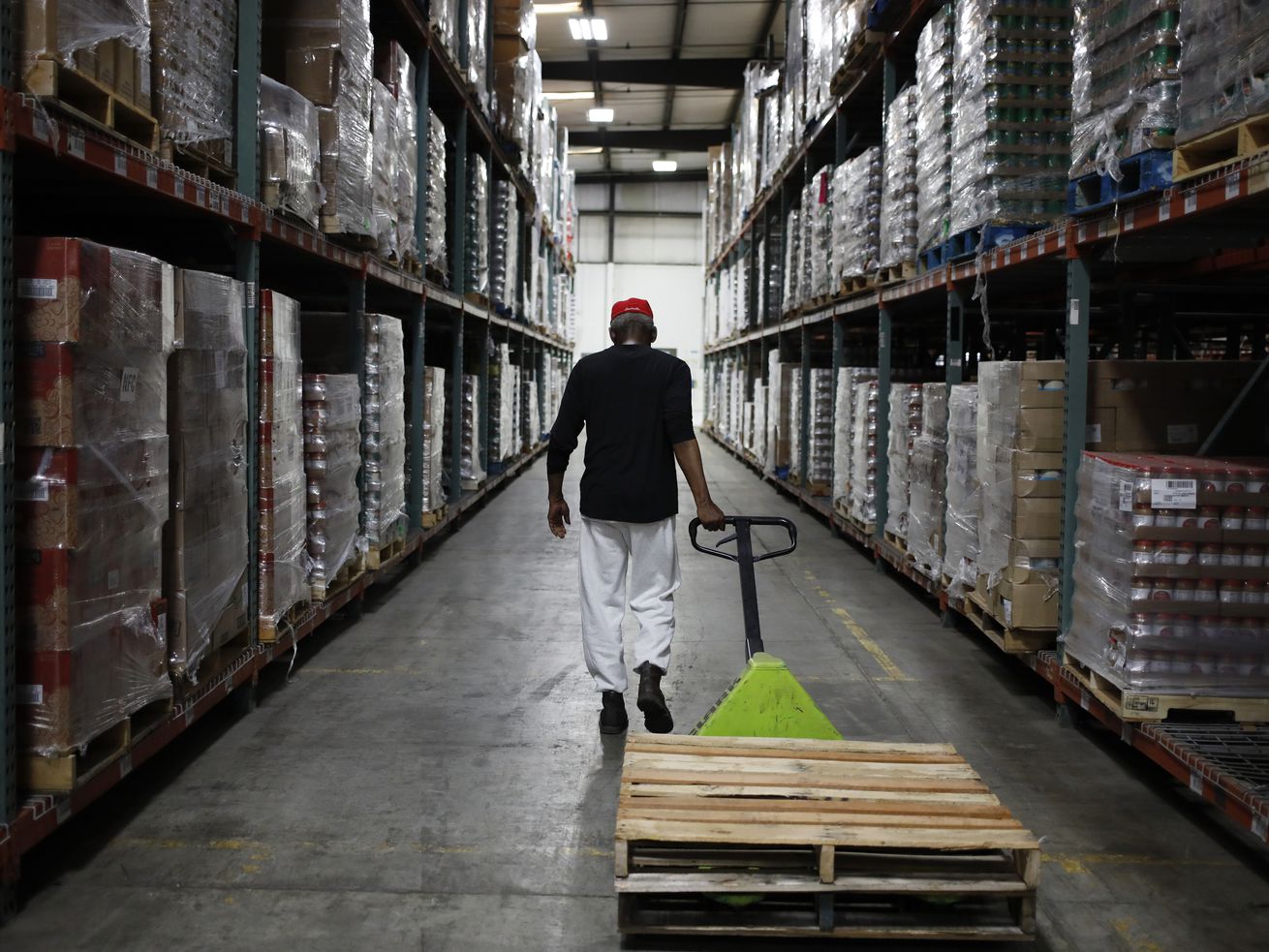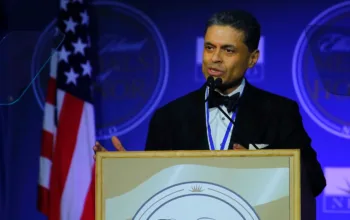The Fed’s rate hikes carry an implicit assumption: Double-digit Black unemployment is worth lower inflation.
The Federal Reserve has already raised interest rates four times this year to try to tame inflation, and more hikes are likely. It’s a tried-and-true method of getting rising prices under control, but it comes at a cost: American jobs, and in particular, Black American jobs.
By raising the cost of borrowing money, the Fed is essentially trying to bring consumer demand in line with supply while reducing the power of workers. In Fed parlance, that’s known as “softening labor market conditions.” What that amounts to is people losing work.
Larry Summers, a former treasury secretary who remains highly influential in the Biden administration, has argued the unemployment rate needs to hit about 5 percent to tame inflation. The overall unemployment rate is currently at 3.5 percent. But there is a painful fact that often goes ignored in this conversation: A 5 percent unemployment rate almost certainly means double-digit unemployment for Black workers.
“The ‘2X problem’ is this persistent, pernicious gap where Black Americans face twice the unemployment as white Americans, no matter what kind of an economy we have, a booming economy or a recession,” Neel Kashkari, president and CEO of the Federal Reserve Bank of Minneapolis, told Vox recently. In September 2022, the Black unemployment rate was 5.8 percent.
On Today, Explained, Kashkari spoke with co-host Noel King about the race gap in unemployment, the Fed’s recent focus on the unique challenges facing Black workers, and why, despite all that, he still supports the interest rate hikes.
Below is an excerpt of the conversation, edited for length and clarity. There’s much more in the full podcast, so listen to Today, Explained wherever you get podcasts, including Apple Podcasts, Google Podcasts, Spotify, and Stitcher.
Noel King
A couple years back, Neel, the Fed started talking not just about unemployment in the US, but about Black unemployment in the US, almost like it was a separate thing. … I remember you, as one of the people who started drawing focus to this, started saying this is important to pay attention to. Why did you do that?
Neel Kashkari
For the years before the pandemic hit, we kept getting surprised. We thought that the economy was at full or what we call maximum employment. Everybody who wants a job has a job. We were hearing from businesses that they couldn’t find workers. And yet the economy continued to grow. People continued to find jobs, and inflation didn’t materialize.
That told us, wait a second, there must be more workers out there than we were realizing. And I would go into low-income communities and communities of color and African American communities. And I met many groups that said, hey, we don’t have jobs or we’re stuck in a part-time job. We want more work. So there seemed to be a disconnect. And it seemed as though those average statistics that we look at for the nation were hiding really important pockets of labor and hiding people who wanted to contribute more to our economy. And that matters a lot for the Federal Reserve to understand what our economy’s potential is.
Noel King
Can you characterize [why Black unemployment is always twice white unemployment] for me?
Neel Kashkari
The 2X problem is this persistent, pernicious gap where Black Americans face twice the unemployment as white Americans, no matter what kind of an economy we have, a booming economy or a recession. It’s pervasive and pernicious, and we have to address it. I think that by better understanding its root causes, we can make progress in addressing it. It’s been around forever. It’s not going to be closed overnight, but we can do it.
Noel King
Let’s talk about where we are now. It’s very perilous. The Federal Reserve is going to continue raising interest rates. That means Black workers could see double-digit unemployment rates, especially if the United States goes into a recession, which no one wants. You support the Fed’s rate hikes. Why?
Neel Kashkari
I support the hikes because we have to get the economy back into balance. The profound gains that we saw in 2017, ’18, and ’19 were all made possible in the context of an overall stable economy with low and controlled inflation. We went through the rapid pandemic. We went through the shutdown. We’ve got this uneven reopening. We have this massive inflation. Inflation is hitting low-income families the worst because they have the least flexibility to be able to adjust their behavior to change and respond to it.
If you’re a higher-income family, maybe you shopped at a premium grocery store and now you shift to a lower-cost grocery store, or maybe you bought premium goods and now you buy the low-cost goods to save money. If you’re the low-income family that was already buying the low-income goods at the low-income grocery store, what do you do? You can’t do anything.
Inflation right now is damaging and hurting all Americans, but it’s disproportionately hurting the lowest-income Americans. And so the Federal Reserve, we have to do our part to get the economy back into balance.
Noel King
But is it worse to have a smaller paycheck due to inflation? Is that really worse than having no paycheck at all? I mean, we’re talking about people being thrown out of their jobs; we know it’s going to happen.
Neel Kashkari
There’s not an easy answer, but I’ll say it this way. Inflation literally affects everybody. The devastation of unemployment, fortunately and unfortunately, affects a smaller number of people. And it’s easier for the government to target assistance to the smaller number of people than it is to try to support all of the American people who are facing this high inflation.
So there’s an issue of numbers, but it’s that’s not an easy story to tell somebody who loses their job, because for them, it’s overwhelming. But let me offer one other perspective. At a recent roundtable I had of labor union leaders in Minnesota, a labor leader who represents low-income service workers made the following statement to me, and I was surprised by it. She said, “Inflation is much worse for our low-income members than is a recession.”
And I said, “I don’t understand that. Explain that to me. How can inflation be worse than recession?”
She said, “Because our members know how to deal with the recession. They lose their job. This happens all the time. They rely on family and friends. They help each other get through it because they’re not all losing their jobs at the same time. The difference is with inflation, they all get hit by inflation, and there’s no one to turn to for help.”
Now, I know I’ve got other friends in the labor movement who have a very different view of this topic. It’s a very complicated topic, and there are no easy answers. But I do know we cannot allow 9 percent inflation to continue in the American economy. That is not going to be good for workers in the long term.
Noel King
I wonder if I can kind of push you at the macro level. You gals and guys in the Fed are very smart people. There’s a lot of PhDs in the room at any Fed meeting, I would venture. Two of the 12 Fed presidents at this point in history are Black. Why is doing a thing that will clobber one segment of American society, Black workers and their families, the only solution you have?
Neel Kashkari
Well, where does inflation come from? It comes from a mismatch between supply and demand. Demand for goods and services in the American economy is far outstripping our economy’s ability to supply it. At the Fed, the only tools we have are demand tools. We can increase demand or lower demand by raising and lowering interest rates so we can bring demand down.
Our hope is that we get some help on the supply side. More workers come off the sidelines, there’s more supply chains, they are less gummed up because of Covid. More people feel confident to go back to work because vaccines have been highly effective. All of those things should boost the supply side of the economy, and then we will have to do less work on the demand side to bring those two things down. Demand tools are the only tools we at the Fed have.
Other policymakers potentially have tools that they can help on the supply side. I speak to members of Congress and senators from my region all the time, talking about these trade-offs and saying we need whatever help we can get on the supply side to bring these two things into balance.
Noel King
Does the Federal Reserve care about Black people?
Neel Kashkari
Absolutely. The reason that I’ve made such an emphasis, as many of my colleagues have, over the last seven or eight years to go into Black communities and other communities of color is we want to make sure that we are hearing directly from important constituents that we are charged to serve. We are charged to represent them. They matter to the economy. They matter to the country. They matter to the Federal Reserve. Ultimately, we cannot set a different interest rate for Black Americans and white Americans. We have to pick monetary policy for the country as a whole. But we want to make sure that we have good visibility into all of these different communities, because they matter.
Author: Miles Bryan
Read More



